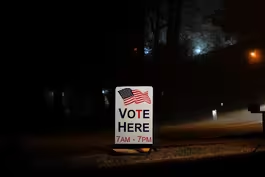
CDC: Teen girls experiencing record high levels of sadness
Clip: 2/20/2023 | 6m 45sVideo has Closed Captions
Teenage girls experiencing record high levels of sadness, violence and trauma, CDC says
In 2021, the CDC saw an increase in mental health challenges across the board, but it’s girls in the U.S. that are engulfed in a wave of sadness, violence, and trauma. Nearly three in five reported feeling persistent sadness and hopelessness, 25% of girls reported having made a suicide plan and 14% reported having been forced to have sex. Stephanie Sy spoke with Sharon Hoover about the survey.
Problems playing video? | Closed Captioning Feedback
Problems playing video? | Closed Captioning Feedback
Major corporate funding for the PBS News Hour is provided by BDO, BNSF, Consumer Cellular, American Cruise Lines, and Raymond James. Funding for the PBS NewsHour Weekend is provided by...

CDC: Teen girls experiencing record high levels of sadness
Clip: 2/20/2023 | 6m 45sVideo has Closed Captions
In 2021, the CDC saw an increase in mental health challenges across the board, but it’s girls in the U.S. that are engulfed in a wave of sadness, violence, and trauma. Nearly three in five reported feeling persistent sadness and hopelessness, 25% of girls reported having made a suicide plan and 14% reported having been forced to have sex. Stephanie Sy spoke with Sharon Hoover about the survey.
Problems playing video? | Closed Captioning Feedback
How to Watch PBS News Hour
PBS News Hour is available to stream on pbs.org and the free PBS App, available on iPhone, Apple TV, Android TV, Android smartphones, Amazon Fire TV, Amazon Fire Tablet, Roku, Samsung Smart TV, and Vizio.
Providing Support for PBS.org
Learn Moreabout PBS online sponsorshipAMNA NAWAZ: Teenage girls in the U.S. are experiencing record high levels of violence and sadness.
That is according to a recent CDC report.
Stephanie Sy dives into the numbers, the scope and the significance of the problem.
STEPHANIE SY: The CDC has been conducting this survey every couple years for three decades, and this new report is the first to measure the well-being of the nation's youth since the pandemic started.
In 2021, the CDC saw an increase of mental health challenges across the board, but as one official said, it's girls in the U.S. that are engulfed in a growing wave of sadness, violence and trauma.
Nearly three in five teen girls reported feeling persistent sadness and hopelessness, double the rate of boys, 25 percent of girls reported having made a suicide plan, and 14 percent reported having been forced to have sex, a 4 percent rise since the last survey.
What's more, 22 percent of teenagers that identify as lesbian, gay, bisexual or questioning have attempted suicide in the past year.
For look at how we got here and what can be done, I'm joined by Sharon Hoover, co-director of the National Center for School Mental Health and professor of psychiatry at the University of Maryland School of Medicine.
Sharon Hoover, thanks for joining the "NewsHour."
I want to jump right in, because there's so many topics.
The decline of youth mental health goes back at least a decade, but the numbers of girls reporting how much they're suffering really stands out in this report.
Why do you think seem to be getting worse for teen girls?
SHARON HOOVER, University of Maryland School of Medicine: That's right.
I mean, I have to say we are not surprised to see increases in mental health challenges.
We have seen these trends happening for the past several years, as you said.
But it was quite surprising in some respects to see the stark gender difference that we saw.
And, as you said, this is the first national look that we have had since the pandemic.
And so it gives us a bit of insight into maybe how boys and girls and different folks have experienced the pandemic differently.
STEPHANIE SY: Why are we looking at this gender gap?
Why are girls suffering so much?
SHARON HOOVER: There's a lot of speculation right now, now that we have seen this stark difference between girls and boys.
One of the hypotheses is that girls were more socially isolated and may rely more on their peers for self-confidence, for self-esteem, or just their general well-being.
And they also have been -- have -- more likely to actually spend time on social media, and not just spend time on it, but time that is excessive, and may reach the threshold of making them at greater risk for anxiety and depression.
STEPHANIE SY: The CDC, Sharon, so schools are on the front line of this crisis.
And that's your area of expertise.
What is the role of schools in addressing hopelessness?
And are they equipped for that task?
SHARON HOOVER: Yes, so I was pleased to see the CDC come out and say that schools need to be a really critical part of how we address this.
Many of us have said that we can't simply treat our way out of this youth mental health crisis.
There's not enough providers, and it really isn't the right approach.
I often talk about how, if we saw 60 percent of our young people being injured in car accidents, the solution would not be to simply hire more physicians in the emergency department.
Rather, we would take a public health approach.
We would take a look at, how can we better equip cars, how can we look at the driving age?
And, similarly, we really need to be taking a public health approach to what's happening with our young people.
And one of the most essential places to do that is in schools.
The CDC has long said that we need to be looking at efforts to promote school connectedness and belongingness.
And when we actually make a concerted effort and investment in those types of positive youth development approaches, we actually see improvements in school connectedness and impact on youth mental health.
So, I absolutely think it's the right way to go in terms of the fix here, or at least one part of the resolution to this.
STEPHANIE SY: I want to come back to what was most startling to me about this report, which is that 14 percent of teenage girls report being forced to have sex, that they are experiencing rape and violence at much higher rates.
Those things would obviously impact mental health.
But shouldn't the headline be, girls are being targeted and raped at alarming rates?
And what is being done about the perpetrators of such crimes?
It was odd to me to see that grouped in with mental health challenges.
SHARON HOOVER: Right.
Well, we know the two are related, of course, as you said.
If you're experiencing sexual assault, you're at much greater risk for mental health challenges.
But, absolutely, there needs to be a headline just calling out what's happening to our young girls.
We have seen a dramatic increase in their self-reported incidents of sexual assault.
And it is startling.
The numbers are really concerning.
And there are measures that can be put in place, again, many of those at the school level, to help our young people navigate relationships and to really prevent some of the sexual assault that we're seeing.
The numbers are striking.
STEPHANIE SY: Finally, Sharon, this CDC report enforces previous research that has shown how lesbian, gay and questioning youth are reporting substantially worse well-being, including also being more likely to experience violence.
Given how there are school boards that are literally fighting over gender identity curriculum, are they even less likely to get their mental health needs met today?
SHARON HOOVER: It's one of our greatest worries, that some of the controversy right now and some of the legislation and just discussion even at the school board level about making our environments and our schools less inclusive for LGBTQ+ youth could really negatively impact this group of students, who are already vulnerable.
We know that LGBTQ youth are much more at risk of suicidality, of depression and anxiety.
And we also know that there are solutions that can be put in place to help them with not only getting mental health supports, but also, at a more public health level, to really make schools a more inclusive, accepting place where they can feel that they belong.
And we're very concerned about some of the legislation that we're seeing, some of the actions by school boards to make their schools less inclusive, which we feel and the data would support puts them at greater risk of mental health concerns.
STEPHANIE SY: Sharon Hoover with the National Center for School Mental Health, thank you so much.
SHARON HOOVER: Thank you so much.
Biden shows solidarity with Ukraine in surprise visit
Video has Closed Captions
Clip: 2/20/2023 | 8m 28s | Biden shows solidarity with Ukraine in surprise visit ahead of invasion anniversary (8m 28s)
Election deniers hold critical positions in GOP politics
Video has Closed Captions
Clip: 2/20/2023 | 5m 35s | Election deniers hold critical positions in Republican politics despite national rejection (5m 35s)
Future of abortion access faces critical test in Wisconsin
Video has Closed Captions
Clip: 2/20/2023 | 6m 37s | Future of abortion access, voting rights faces critical test in Wisconsin primary (6m 37s)
Michelle Yeoh on her Oscar-nominated performance
Video has Closed Captions
Clip: 2/20/2023 | 7m 33s | Michelle Yeoh on her Oscar-nominated performance in 'Everything Everywhere All at Once' (7m 33s)
Shelters struggle as pets adopted during pandemic returned
Video has Closed Captions
Clip: 2/20/2023 | 4m 37s | Animal shelters struggle as many pets adopted during pandemic are returned (4m 37s)
Ukrainian drones helps guide strikes against Russian forces
Video has Closed Captions
Clip: 2/20/2023 | 7m 14s | How Ukrainian drone pilots are changing the course of the war against Russia (7m 14s)
Providing Support for PBS.org
Learn Moreabout PBS online sponsorship
- News and Public Affairs

FRONTLINE is investigative journalism that questions, explains and changes our world.

- News and Public Affairs

Amanpour and Company features conversations with leaders and decision makers.












Support for PBS provided by:
Major corporate funding for the PBS News Hour is provided by BDO, BNSF, Consumer Cellular, American Cruise Lines, and Raymond James. Funding for the PBS NewsHour Weekend is provided by...






